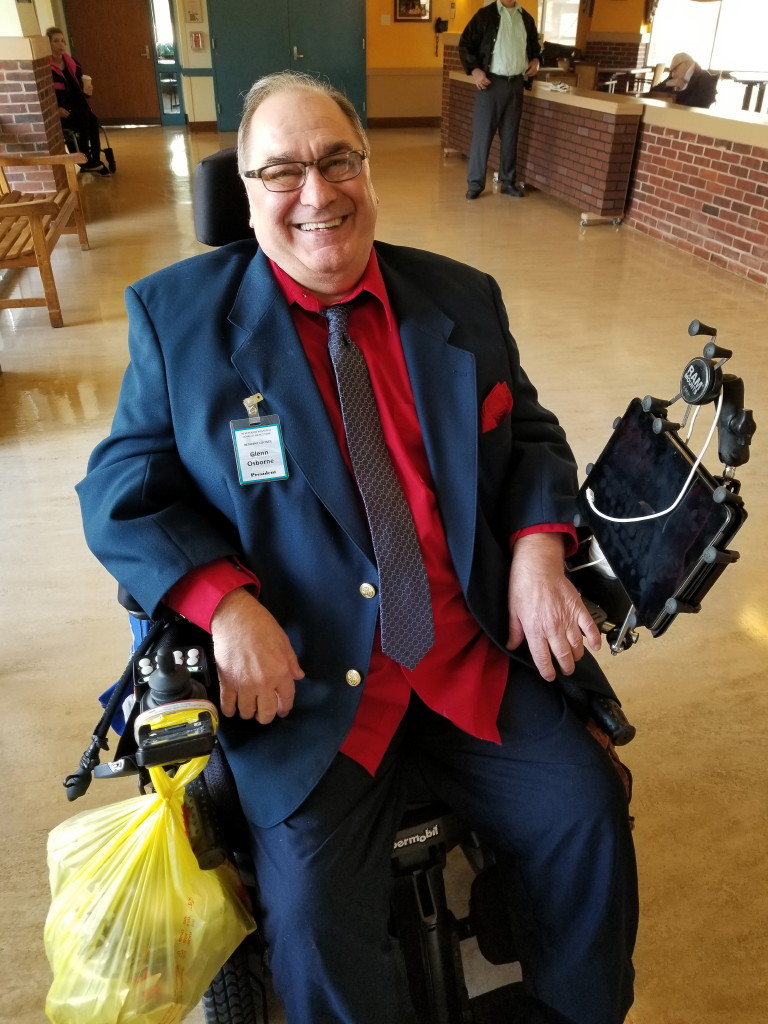EDISON – When the ALS ice bucket challenge went viral five years ago, Glenn Osborne was two years into his journey with the debilitating disease, which he had never heard of prior to his diagnosis.
“I was walking in the hallway of my office when my foot dropped and I fell flat on my face,” he said.
After a couple more “embarrassing” instances, Osborne knew he had to find out what was happening.
It was 2012 when Osborne heard his diagnosis – ALS, amyotrophic lateral sclerosis – and it brought a flood of questions of what he was processing – possibly terminal, no known cure, responsibilities and needs to be taken cared of, and clinical trials.
ALS, according to the ALS Association, is a progressive neurodegenerative disease that affects nerve cells in the brain and the spinal cord. Motor neurons reach from the brain to the spinal cord and from the spinal cord to the muscles throughout the body. The progressive degeneration of the motor neurons in ALS eventually leads to their death. When the motor neurons die, the ability of the brain to initiate and control muscle movement is lost. With voluntary muscle action progressively affected, patients in the later stages of the disease may become totally paralyzed.
After the emotion and shock of his diagnosis settled, Osborne said he made the decision to do everything in his power to help those with ALS and remove any stigmas surrounding the disease. That is why he has participated in every clinical trial, which has brought him to Drexel University and the University of Pennsylvania.
“I thought the ALS Ice Bucket Challenge was amazing,” he said, adding ALS is not contagious and the feeling of cold ice is what the body is going through, as well as gasping for air. “Some days are difficult with muscle spasms and having a hard time to move and other days you feel like you can jump higher than a building.”
The $115 million in donations raised through the 2014 ALS Ice Bucket Challenge spurred a massive increase in the ALS Association’s capacity to invest in promising research, the development of assistive technologies, and increased access to care and services for people with ALS, according to the ALS Association. Since 2014, the association has committed more than $131 million toward its mission, including more than $89 million committed specifically to worldwide research collaborations.
Osborne was born in Sacramento, California, and grew up in South Dakota. As a Vietnam War veteran in the helicopter squadron, serving the country from 1972-78, Osborne was always on the move.
He said the veteran’s hospital has listed his time in the military as a contributing factor to his diagnosis.
Despite his diagnosis, Osborne said he remains strong, has a positive outlook on life and remains an adventurer. In 2014, he embarked on a 21-day cross-country train ride from the northern part of the United States to the West Coast and down to Texas, Arizona, Louisiana, Washington, D.C. and back to New Jersey. He said he has aspirations to travel to the Florida Keys.
Today, Osborne calls Edison home as a resident of the New Jersey State Veterans Memorial Home in Menlo Park and has the support of his family, including a son and daughter. He is active in the Edison veterans community and serves as a member of Joan Dancy and PALS (People with ALS) Foundation, which serves ALS patients and their families in Monmouth and Ocean Counties by providing direct grants for products and services to improve their everyday lives.
Contact Kathy Chang at [email protected].

